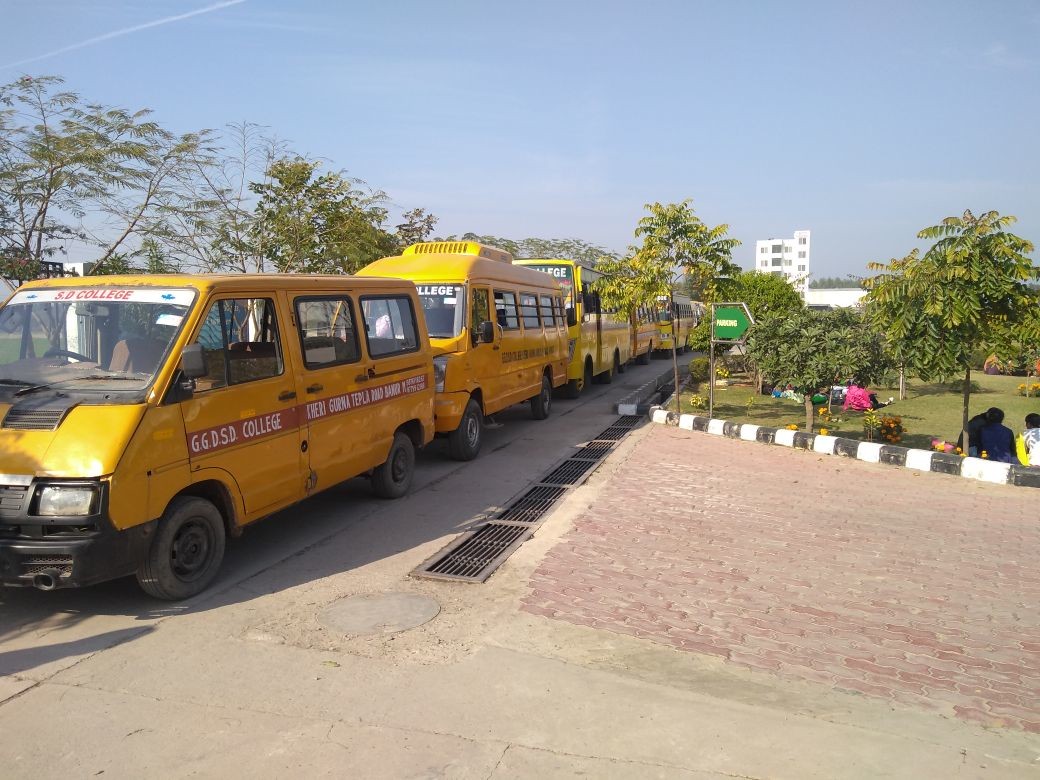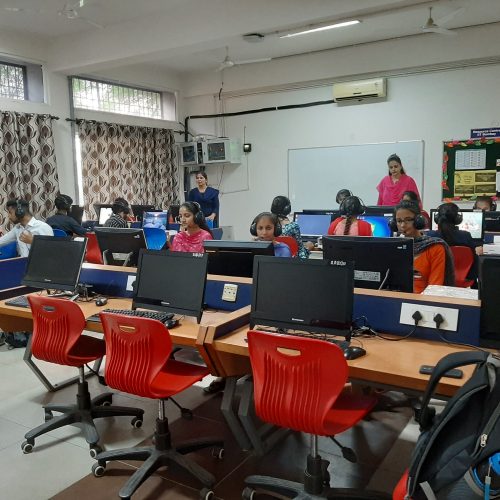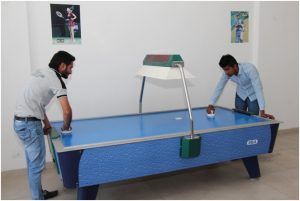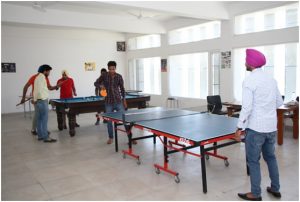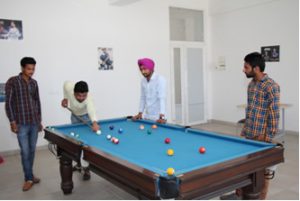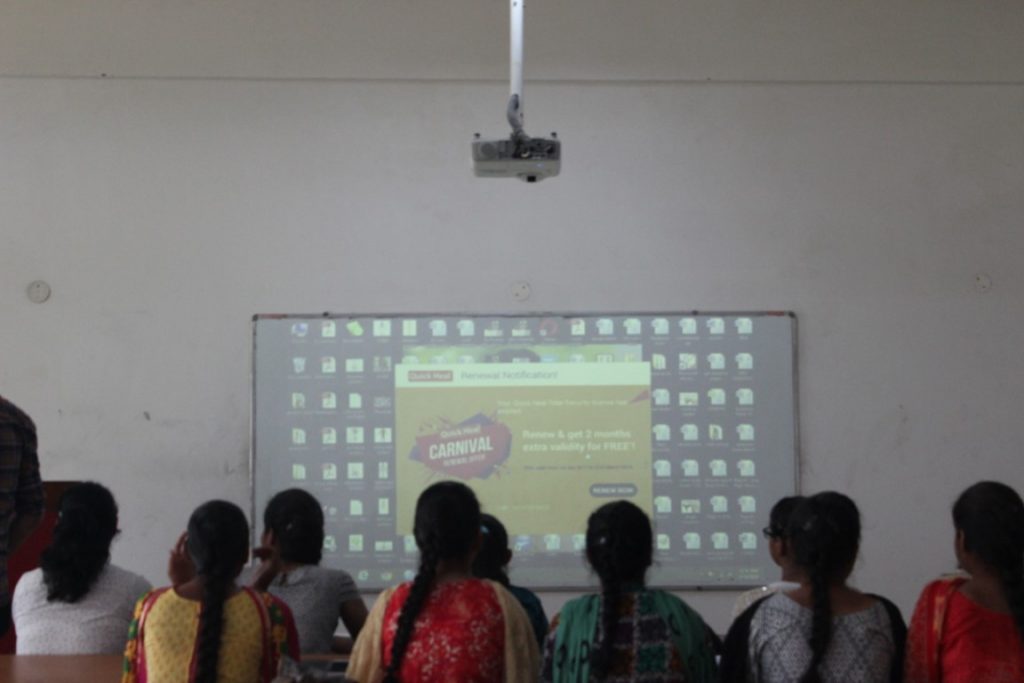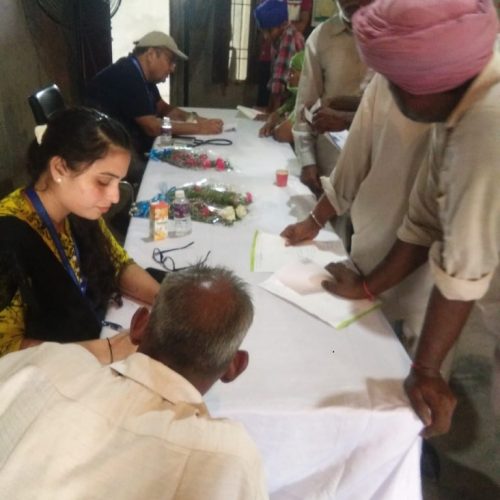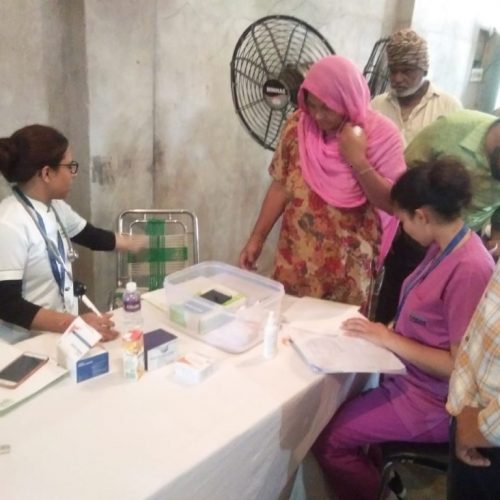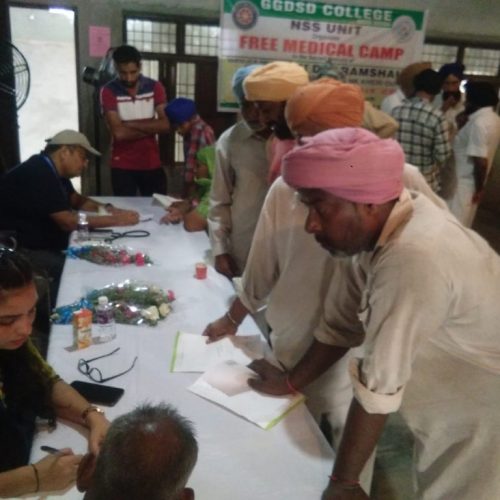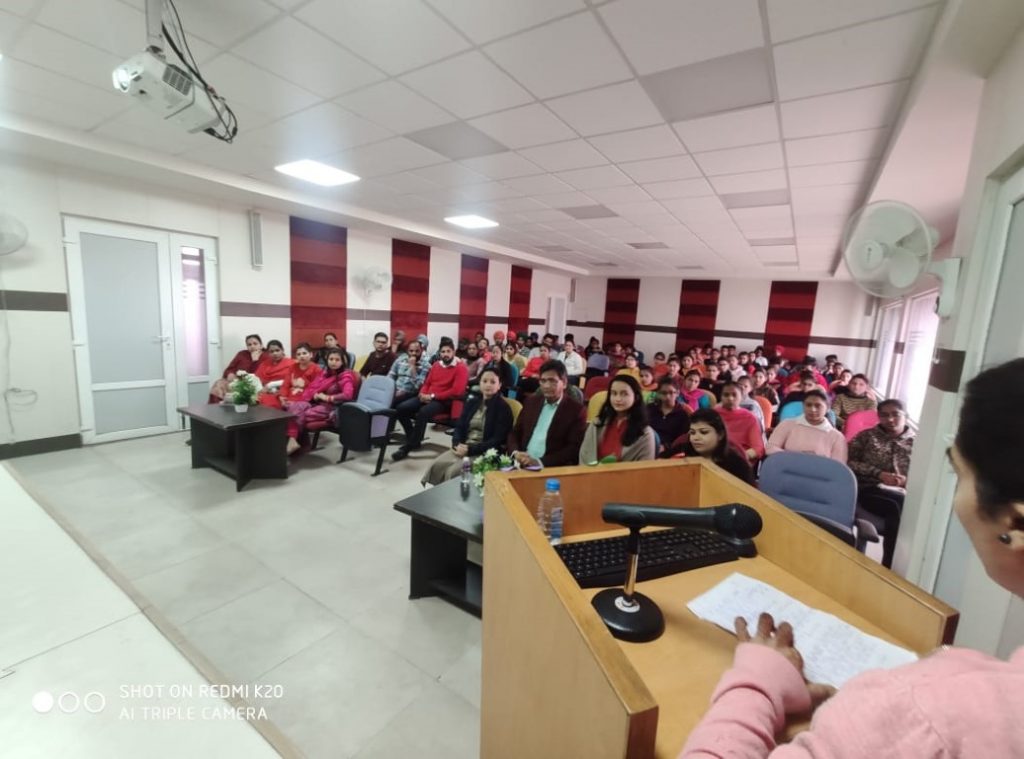The college is spread over an area of more than 7 acres of land at village Kheri Gurna near Banur. The infrastructure of the college is also good. Classrooms are properly equipped. Labs are well maintained good with fast net connectivity. Canteen having sufficient infrastructure for seating 600 students and the food served is also fresh and nutritious. . The entire college campus is Wi-Fi enabled and provides quick internet access to faculty and students.
The college is visualized as a place of learning that would strive towards higher degree of excellence in development of the mind and spirit. GGDSD Kheri Gurna College prides itself in associating with and nurturing highly intelligent, inspired and hardworking personalities.
The information technology hub of the college, the computer lab is spacious and well-equipped with latest terminals and super fast Wi-Fi connectivity. Beautifully conceptualized, huge glass walls on one side amidst the pastoral landscapes add an old world charm to its overall architectural get up. It offers an any-time walk in facility to all faculty and students and provides quick information exchange at a mere click of a button. It is often utilized by faculty for conducting ICT based classroom activities and projects..
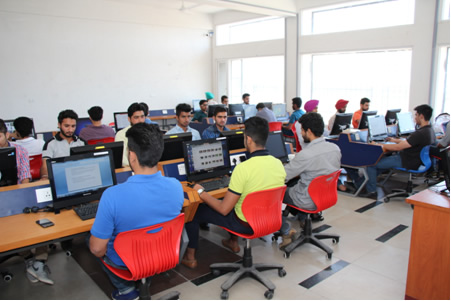
GGDSD College, Kheri Gurna, Banur has established a Digital English Language Lab which is a great platform for the students who aspire to improve their communication and soft skills. In the contemporary scenario, it is almost necessary for a learner to have a good command over the language to ensure an overall success in life. To equip the students with good communication skills, the department of English has its own lab for Functional English course. The lab is well equipped with projector screens and audio visual aids. The purpose of this lab is to provide learners with opportunities to develop each skill- Listening, Speaking, Reading and Writing.
The lab is well equipped with the latest technologies which include audio visual aids and projector screens.
1. About Library
INTRODUCTION
A well-managed library is an essential input to academics. It is always a crucial learning resource for students. GGDSD College, Kheri Gurna has established a well-stocked library with more than 6070 books, 12 latest national periodicals and 04 newspapers.
The Library has a rich collection of books related to curriculum as well as the reference books. The college Library provides congenial atmosphere for self study and it supplements classroom teaching. It has the State-of–the-Art infrastructure with comfortable furniture. Library staff is committed to help students utilize the library resources in best possible way. The library aims at subscribing to reputed journals and magazines in various subjects as well as interdisciplinary research areas in the near future.
FUTURE VISION AND MISSION OF THE GGDSD COLLEGE LIBRARY:
The Library shall strive to achieve the status of a library of national repute to become fountainhead in providing information and services through digital, hybrid and virtual library facilities to meet the changing global needs of end users. The library will be the hub of a full- service information and instruction network, designed to facilitate the delivery of recorded knowledge and information.
The Library will be the campus entity responsible for acquiring, cataloging, preserving, and providing access from any location to recorded knowledge, information, and data in all formats.
Objectives:-
In pursuit of its vision and mission, the Library aims to fulfil the following objectives:-
- To create various databases for non-book materials like e-books, e-journals, and e-projects.
- To provide appropriate knowledge resources to meet the information needs of the academic community of the institute.
- To develop and disseminate knowledge through print, audio-visual, electronic media and various forms.
- To build a state-of-the-art knowledge resource centre for Commerce, Management and other allied subjects.
- To provide proactive and innovative information services to the academic community of the institute.
- To generate new services and to improve the efficiency of existing ones.
- To create awareness amongst all users’ groups and to educate them in the utilization of information.
Education is the backbone for the progress of any society. Libraries provide the crucial role in promoting education, research, personality development, ethics and other important values.

2. Membership & Rules
MEMBERSHIP AND RULES
Loan Privileges to Members of Faculty
(a) Members of Faculty – 10 books
(b) Lecturers on Contract Basis – 4 books
(c) Lecturers as Guest faculty- 4 books
(d) Non-Teaching Staff – 4 books
(e) Post Graduate Students – 4 books
(f) Under Graduate Students – 2 books
GUIDELINES TO ISSUE AND RETURN THE BOOKS
Period of Loan
Period of Loan
Members of Faculty, Professors, Lecturers & Teachers – 1 Month/30 Days
Lecturers working on Contract Basis – 1 Month/30 Days
Lecturers working as Guest faculty – 1 Month/30 Days
Non-Teaching Staff – 1 Month/30 Days
Post Graduate Students – 21 Days
Under Graduate Students – 14 Days
(a) Loss of Books
- The books reported to have been lost shall be either replaced by the latest edition along with additional charge of Rs. 50 per volume as cost of binding wherever applicable plus Rs. 50 per volume as service charges. OR paid for at the price available in the latest catalogues/tools plus 10 per cent of the price as service charges.
- In case the book is out of print or rare and its latest price is not available, the Librarian will decide the amount to be charged.
- In case of Rare and Reference books which are either out of print or not readily available in the market, the amount to be charged can be five to ten times the cost of the book. In such cases the cost to be charged will be fixed by the Principal on the recommendation of the Librarian.
(b) Renewal of books
The loan of a book may be renewed as per the discretion of the Librarian, if it is not in demand.
(c) Overdue Charges
An overdue charge of Re. 1/- per volume per day will be levied if a book is kept beyond the permissible period of loan. But for books issued for overnight use the rate of overdue charges will be Re.1 per volume per hour. Normal period for loan for such book will be from the hour before the closing of the library to one hour after the library opens on the next working day. These overdue charges may be remitted, in special cases, at the discretion of the Librarian. In case a member does not pay the delay fine, the Librarian is authorized to detain his/her Reader’s Ticket/Pass Book till the amount is cleared.
In case of college Teachers the books drawn by them and falling due during the vacations can be returned within 2 days after the expiry of vacation without any overdue charges.
(d) The Librarian is empowered to recall any book at any time if necessity arises.
(e) Manuscripts, reference books and rare books are placed in restricted category and are not to be lent out except in very special cases where the rule may be relaxed on the recommendation of the H.O.D./Principal and at the discretion of the Librarian.
(f) Books lost or damaged will be replaced or paid for to the satisfaction of the Librarian. No marking or writing on or tracing from any library material is permitted. Any infringement of the above may require replacement of the book, and other reading material including audio-visual aids. For a serious mutilation of a book or a periodical, a fine of up to Rs.100 may also be imposed by the Librarian in consultation with the H.O.D/Principal of the college.
(v) Issue-System
Reader’s Ticket shall be given at the time of getting the books issued and the identity card shown. The tickets will be returned to the reader when he returns the books. All members will be issued membership pass books at the time of enrolment.
For books of ‘Reserved Books Section’ student will be entitled to borrow them and shall obtain a special token ticket to be used along with the Reader’s Ticket.
(vi) Cards and Tickets are not transferable.
Special care should be taken to ensure that the Identity Card and Reader’s Tickets are not misplaced or lost. All losses shall be reported immediately to the Librarian. When an Identity Card is lost together with a Readers’ Ticket, a fine of Rs. 100 will be required to be paid along with the charges for loss of tickets and identity card.
The special security shall be refundable on claim, after the expiry of the academic year.
If a member loses his Identity Card/Readers’ Ticket/Pass Book, a duplicate one may be issued on payment of fee as under:
Reader’s Ticket – Rs. 50 per ticket
The member, however, will continue to be responsible for any loss which the library may suffer through the loss or misuse of his/her card or ticket.
(vii) Clearance Certificate
The Identity Card and the Reader’s Ticket are the property of the Library and shall be returned; dues, if any, shall be paid and a Clearance Certificate obtained before a University Examination or before the person concerned leaves the Institution concerned permanently.
(viii) Change of address or other information
Members should keep the Library informed of any change of address, change of college, class or subject of study during the period of membership.
(ix) Any misuse of the Library privilege shall be considered as a breach of discipline and the Librarian shall have power to take such action as he considers necessary after consulting the H.O.D/ Principal of the college.
3. Services
SERVICES
Borrowing & Circulation
This section represents the hub of library activities where lending of the books to readers is facilitated. Of all the library activities, the circulation of books for home use is a major public service provided by the library.
In the circulation Section various functions are undertaken viz.
- Registration of new members
- lending of books
- reminders for overdue books
- reservation of books
- records and files
- statistics and
- inter library loans etc.
Reference Services
Reference service is the most intensive kind of personal service which attempts to bring together the user and information in a personal way. There are two types of reference services: Direct and Indirect. Under direct reference services, personal assistance is provided, directly to the user. It may take the form of library instruction and information service. Indirect reference service consists of information provided through development of catalogues, bibliography, and other reference aids. The current era has acquired the name of “Information Era”. Libraries and computers can contribute towards efficiency in disseminating of information.
Retrospective Searches
On request, retrospective literature searches, on topics of interest, will be conducted by the library. The service would include all the sources held by the library in print, non-print as well as the databases.
GGDSD College E-library WhatsApp Group :- A college library WhatsApp Group has been formed to provide latest & general knowledge awareness services to the users. Around 300 students of the college are connected with the Library through this WhatsApp group.
4. Digital library
Digital Library
- National Digital Library of India – https://ndl.iitkgp.ac.in/
National Digital Library of India (NDLI) is a virtual repository of learning resources which is not just a repository with search/browse facilities but provides a host of services for the learner community. It is sponsored and mentored by Ministry of Education, Government of India, through its National Mission on Education through Information and Communication Technology (NMEICT). NDLI is designed to hold content of any language and provides interface support for 10 most widely used Indian languages. It is developed, operated and maintained from Indian Institute of Technology, Kharagpur. All types of resources, such as Books, Audio Books/Lectures, Video lectures, Lecture Presentations/Notes, Simulations, Question Papers, Solutions, etc. are available on the website. The college have done the registrations for all the students and faculty members. - SWAYAM (Study Webs for Young Aspiring Minds) – https://swayam.gov.in/It is a programme initiated by Govt. Of India and designed to achieve the three cardinal principles of Education policy i.e. access, equity and quality. The objective of this effort is to take the best teaching learning resources to all, including the most disadvantaged. It seeks to bridge the digital divide for students who have hitherto remained untouched by the digital revolution and have not been able to join the mainstream of the knowledge economy. This is done through a platform that facilitates hosting of all the courses, taught in classrooms from Class 9 till post-graduation to be accessed by anyone, anywhere at any time. All the courses are interactive, prepared by the best teachers in the country and are available, free of cost to any learner. More than 1,000 specially chosen faculty and teachers from across the country have participated in preparing these courses.
- e-PG Pathshala – https://epgp.inflibnet.ac.in/It is an initiative of the MHRD under its National Mission on Education through ICT (NME-ICT) being executed by the UGC. It provides the platform to provide 700+ e-Books for the Post-Graduate Courses. All the e-Books are derived from e-PG Pathshala courses. It also facilitates play-list of video content. e-Pathya is one the verticals of e-PG Pathshala which is software driven course / content package that facilitates students pursuing higher education (PG level) in distance learning as well as campus learning mode. It also facilitate offline access.
- PDL (Punjab Digital Library) – http://www.panjabdigilib.org/webuser/searches/mainpage.jspThe mission of the Panjab Digital Library (PDL) is to locate, digitize, preserve, collect and make accessible the accumulated wisdom of the Panjab region, without distinction as to script, language, religion, nationality, or other physical condition. It helps in addressing heritage loss due to environment, ignorance and destruction. It provides valuable treasures to enrich the present and enlighten the future. It also helps in connecting people globally by providing continued free online access.
- Shodhganga: A Reservoir of Indian Thesis- https://shodhganga.inflibnet.ac.in/Shodhganga is the name coined to denote digital repository of Indian Electronic Thesis and Dissertations set-up by the INFLIBNET Centre. The word “Shodh” originates from Sanskrit and stands for research and discovery. The “Ganga” is the holiest, largest and longest of all rivers in Indian subcontinent. The Ganga is the symbol of India’s age-long culture and civilisation, everchanging, ever-flowing, ever-loved and revered by its people, and has held India’s heart captive and drawn uncounted millions to her banks since the dawn of history. Shodhganga stands for the reservoir of Indian intellectual output stored in a repository hosted and maintained by the INFLIBNET Centre. Shodhganga provides a platform for research scholars to deposit their Ph.D. thesis and make it available to the entire scholarly community in open access. The repository has the ability to capture, index, store, disseminate and preserve ETDs (Electronic Thesis and Dissertations) submitted by the researchers.
- DOAB: Directory of Open Access Books – https://www.doabooks.org/DOAB is a community-driven discovery service that indexes and provides access to scholarly, peer-reviewed open access books and helps users to find trusted open access book publishers. All DOAB services are free of charge and all data is freely available. DOAB provides open access 36,677 academic peer reviewed books from 600 publishers. One can search the e-books by subject, language and publishers.
- DOAJ: Directory of Open Access Journals:- https://doaj.org/The DOAJ (Directory of Open Access Journals) was launched in 2003 with 300 open access journals. Today, this database contains over 15 000 peer-reviewed open access journals covering all areas of science, technology, medicine, social sciences, arts and humanities. Open access journals from all countries and in all languages are welcome to apply for inclusion. DOAJ is financially supported by many libraries, publishers and other like-minded organisations
- Sakshat- https://sakshat.ac.in/Sakshat-One India One Digital Platform is an integrated (Class I to PG level) e-Content portal which provides facility to search and browse all hosted content or metadata of other hosted content wherein a learner can easily access the desired material including audio/video learning material, textual material, multimedia enriched materials etc. With the aim of one India One Digital Platform, this one portal provides digital platform to SWAYAM, SWAYAMPRABHA, NDLI, FOSSEE, E-SHODHSINDHU, SHODHSHUDHHI, E-PG PATHSHALA, SAMARTH, BAADAL AND VIDWAN etc.
5. Digital Content
6. Unique and different features
The hostel provides well ventilated rooms with a wooden bed, a mattress, with attached toilet, wardrobe, couch, study table, regular housekeeping as well as housekeeping on request (in specific time zones), etc. Privacy ensures ease of studying / concentration. The hostel has uninterrupted electricity and water facility. Water coolers with water filters are provided for drinking water facility.
- No of rooms: 20
- Mess and Canteen for students
- Entertainment room
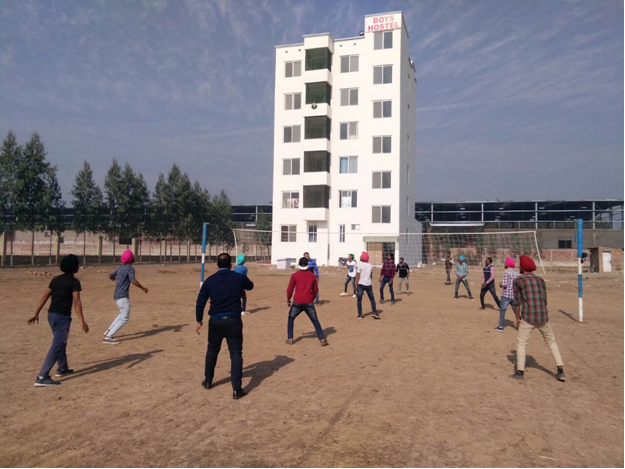
The college building houses a spacious and well-designed Recreation Room to provide necessary rest and rejuvenation to its students and educators alike. Brainstorming and psychologically stimulating games provide optimum recreation and help students recharge their minds from time to time.The recreation room offers a wide range of indoor games that include Chess, Carrom, Chinese Checkers, Table Tennis, and Snooker. For outdoor activities, the college provides facilities for Athletics, Shot put, Javelin and Hammer Throw.
In the recently held Inter-College Competition organized by Punjabi University Patiala in the month of October and November, our star performers kept their promise and won 5 medals in Wrestling and 2 medals in Judo respectively. For outdoor sports activities, college offers a well laid athletic track and cricket pitch. In addition to this, Volley ball and Kabaddi courts encourage and attract lot of students to play and rejuvenate themselves.

The college has well furnished smart classrooms for ICT enabled classroom instruction.
The college organizes timely Medical Camps in order to ensure proper health status of its students and facilitators. Experts are invited for conducting health checkups and catering to health related queries and anxieties of the students.
The college has a well-equipped Seminar Hall with seating for around 100 people. It serves as the venue for the regular conferences, workshops and seminars that are part and parcel of the teaching learning practice.
It also hosts a range of cultural and literary activities. It is spacious, ventilated and fully furnished with projectors, screens, white boards and audio systems.
For the convenience of the non-resident students and staff members, the institute arranges a sufficient number of buses at nominal rates. These buses pick the students from most of the locations in the tricity and adjoining areas to institute & back at fixed time as per the schedule of the college.
